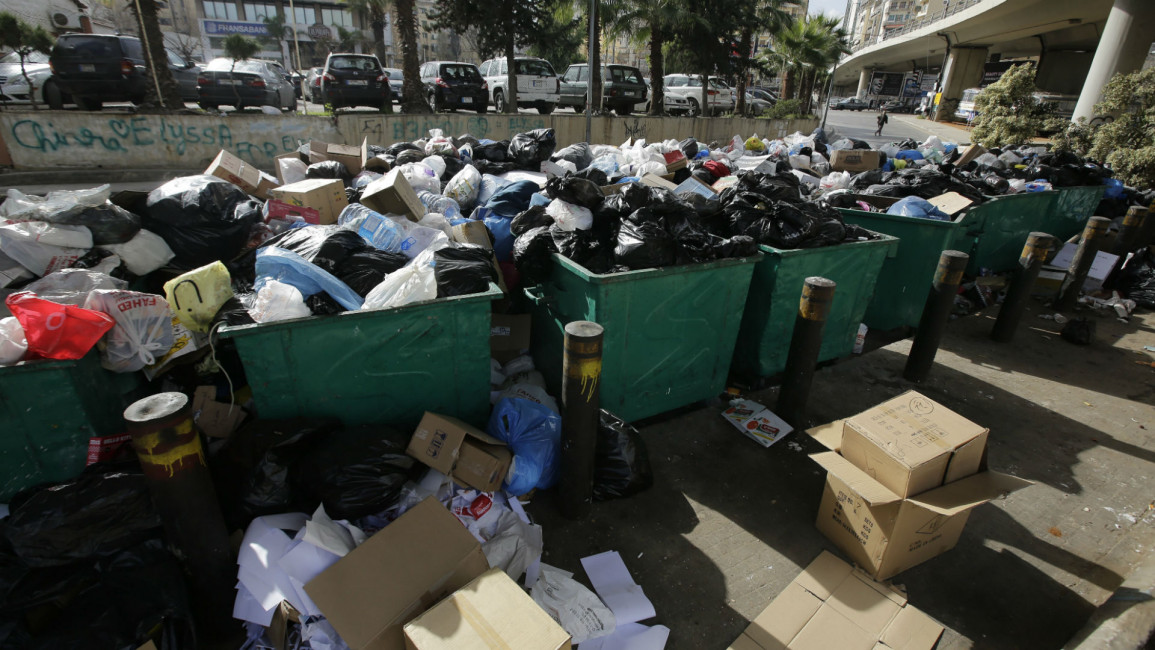Beirut 'to fill with rubbish' as landfill closure nears
Beirut 'to fill with rubbish' as landfill closure nears
Lebanon faces a rubbish crisis with the deadline to close Naameh landfill site looming closer, and no waste management company to replace Sukleen when its contract ends on July 17.
3 min read
Beirut's last rubbish crisis was in January 2014 [AFP]
Beirut is threatened with a major rubbish crisis in the coming weeks, due to the planned closure of the Naameh landfill site south of the city on 17 July.
The closure coincides with the end of Sukleen's contract, the company responsible for cleaning the city.
Originally opened in 1997, Naameh was designed to receive two million tonnes of waste and close within ten years.
Instead, the decision to close it has been postponed several times - and the dump has received 15 million tonnes of rubbish to date.
This has angered local residents who complain about the health risks caused by site and its suffocating odour.
They have threated a repeat of protests held in January 2014 if it remains open, when neighbours blocked roads to the dump, causing rubbish to build up for several days on the streets of the capital. The blockade was finally broken by the police.
The closure coincides with the end of Sukleen's contract, the company responsible for cleaning the city.
Originally opened in 1997, Naameh was designed to receive two million tonnes of waste and close within ten years.
Instead, the decision to close it has been postponed several times - and the dump has received 15 million tonnes of rubbish to date.
This has angered local residents who complain about the health risks caused by site and its suffocating odour.
They have threated a repeat of protests held in January 2014 if it remains open, when neighbours blocked roads to the dump, causing rubbish to build up for several days on the streets of the capital. The blockade was finally broken by the police.
| The people of Naameh cannot bear it anymore. They cannot live there. - Paul Abi Rachid, president of Lebanon EcoMovement |
"The people of Naameh cannot bear it anymore. They cannot live there," Paul Abi Rachid, the president of Lebanon EcoMovement, told The Daily Star.
The government had promised to close the site in July 2015. However, the ministry of the environment has failed to find a location for a new landfill site.
As a result, officials decided that the tender winner for the new site would also be responsible for securing a new site.
This scared off bidders - with even Sukleen failing to submit a bid. The government said it had not received enough bids to select a winner competitively, leaving empty the position of responsibility for cleaning the city.
With the cabinet currently paralysed due to a dispute between rival parties over the posts of high-ranking military and security officials, it is unknown if the issue will be resolved before Naameh closes on July 17.
Other cities around the world have experienced similar waste management problems.
Naples in Italy faces an ongoing crisis, due to overfilled landfill sites.
The problem reached its peak in summer 2008 after the government closed one of the two major dumps near the city at the request of local residents.
The situation was resolved after new landfill sites were opened and incinerators built. Allegations of involvement by Mafia-style groups in the dispute and subsequent resolution were frequent.
Better recycling methods, however, would help avert such crises in the first place.
Beirut and Mount Lebanon, for example, produce 2,500 tonnes of rubbish a day - of which only 18 percent is recycled or composted, according to a 2013 report by Sweep-Net, a Middle Eastern waste expertise network.



